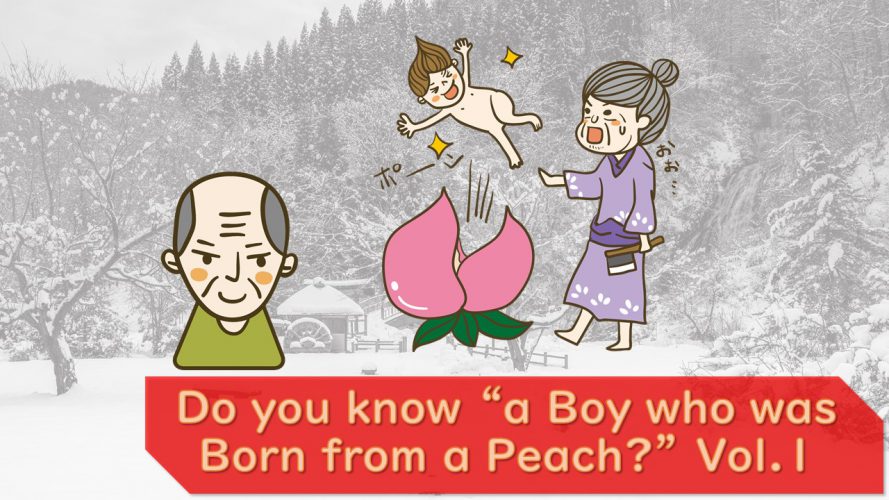JAPANESE LESSON
Do you know “a Boy who was Born from a Peach?” Vol. 1

Today, let’s read a Japanese famous old tale, “桃太郎(momotaro).” You may know this story as “Peach boy.”
“桃(momo)” means peach, and “太郎(taro)” is a typical Japanese name for a boy.
Let’s read this story in Japanese and learn Japanese.
桃太郎(momotaro)
むかし、むかし、ある所(ところ)におじいさんとおばあさんが住(す)んでいました(1)。
Long, long ago in a certain place, there were an old man and an old woman.
おじいさんは山(やま)へしば刈(か)りに、(2)おばあさんは川(かわ)へ洗濯(せんたく)に行(い)きました。
Old man went to the mountain to gather brushwood, and old woman went to the river to do the laundry.
おばあさんが川(かわ)で洗濯(せんたく)をしていると大(おお)きな桃(もも)が流(なが)れてきました。
While she is washing, a big peach came floating down the river.
「なんと大(おお)きな桃(もも)じゃ(3)ろう!家(いえ)に持(も)って帰(かえ)ろう。」
“What a big peach that is! I’ll take it home.”
とおばあさんは(4)背中(せなか)に担(かつ)いで家(いえ)に帰(かえ)り、その桃(もも)を切(き)ろうとすると、なんと桃(もも)から大(おお)きな赤(あか)ん坊(ぼう)が出(で)てきたのです。
She took it home and tried to cut it, and then a big baby came out of the peach.
「おっとたまげた。」
“Wow, it’s amazing!”
二人(ふたり)は驚(おどろ)いたけれども、とても喜(よろこ)び、
Both were surprised, but very glad.
「何(なん)という名前(なまえ)にしましょうか。(5)」
What shall we name him?
「桃(もも)から生(う)まれたから、桃太郎(ももたろう)というのはどうだろう。」
Since he was born from a peach, how about Momotaro?
「それがいい。」
That’s good.
Note
(1) 住んでいました(sundeimashita)
“住む” means live, but “住んでいる” is closer to “there were ~.”
It’s almost same as “an old man and an old woman lived.”
(2) Japanese language can omit conjunction, “and.”
(3) Old people tend to use “じゃ(ja)” instead of “だ(da).”
(4) おばあさんはその桃を背中(せなか)に担(かつ)いで
The object “その桃を(sonomomowo)” is omitted.
(5) We can also say “何(なん)と名付(なづ)けましょうか。”
It’s same, but “名付ける” has a closer image to the verb “name.”
This is the first part of “桃太郎” and we have 4 more parts for this story. A boy was born from a peach and they named him “桃太郎.”
I recommend you to read the story in Japanese as a practice.
I hope you are looking forward to the continuation.

Leave a Comment